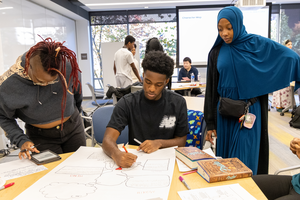The parent-teacher relationship is precious—and complicated. It’s precious because of the potential for a partnership that supports our children’s learning, their development, and their lives.
It’s complicated because it’s a “hot” relationship charged with love, commitment, hope, dreams, fears, righteousness, frustration, power dynamics and, sometimes, fury. Parent-teacher relationships are also complicated because the conversations parents and teachers have are often at the center of many complex and–sadly—broken social systems that impact schools and kids. Add to this the fact that many parents see teachers as having too much power over them and their kids, and that many teachers feel ill-equipped to deal with the issues they face in their schools, districts, and even their classrooms.
Dr. Annie McKee, the Director of the Penn GSE’s Chief Learning Officer Executive Doctoral Program, studies the dynamics of relationships in education. She offers these suggestions for smoothing out your relationships with parents:
Plan ahead.
When parents and teachers sit down to talk, both parties can be fearful and self-protective, and conflict is almost inevitable. This is obviously not a good place to start an important conversation about a child’s learning or her future. It can go downhill when the conversation gets tough, when a parent misunderstands a teacher’s comments, or a teacher misreads a parent’s emotions. Most parents and teachers strive to avoid this scenario. But in actuality it’s pretty common. Take steps to avoid a breakdown before one can happen.
It all starts with self-awareness.
Good leaders work hard to develop an understanding of how their emotions impact their thoughts and behaviors. This is emotional intelligence in action. Parents are leaders. So are teachers. One way to ensure better relationships between us is to seek to understand the programmed feelings and habitual thoughts we have about one another. What’s my stress level today, and how might that affect how I come across? What assumptions am I making about this parent? Am I inadvertently judging this person unfairly?
Managing our feelings.
We all know that we shouldn’t fly off the handle when someone says something we don’t like, or shut down, or make assumptions about people—but we all do these things. Part of the reason is that when we are stressed we can fall prey to the “feel-act-think” syndrome. This is an amygdala hijack—the limbic brain takes over, fight/flight kicks in, and our rational brain takes a break. Emotionally intelligent people, on the other hand, hone skills related to self-management and get the order right: feel….think….act. Often, parents have a deep and primal reaction to a teacher—a reaction that is borne of childhood experiences and one’s own relationship with powerful people in adult life, too. Sometimes, and unfortunately, teachers feel uncomfortable making real contact with parents—having real conversations. To avoid this, and to protect themselves, they do what humans often do in such situations: magnify the power differences, and act in a role-based, more distant manner.
Every interaction brings choices.
Some interactions, like those between parents and teachers, are charged to begin with. Simply slowing down, and asking oneself a few questions can help so much: Will I lean in to my frustration or stress, or will I dig deep to find empathy? Will I emphasize the negatives, or focus on the positive messages I can share?

Subscribe to the Educator's Playbook
Get the latest release of the Educator's Playbook delivered straight to your inbox.
Media Inquiries
Penn GSE Communications is here to help reporters connect with the education experts they need.









